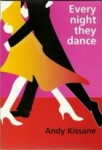Andy Kissane, Every Night They Dance (Five Islands Press 2000)
Someone I’ve never met emailed me to say they’d stumbled upon my blog post about Andy Kissane’s recent book, Out to Lunch, and told me among other things that the one remaining copy of his previous book was on the shelves at Gleebooks in Dulwich Hill. Well, what is one to do in response to such individualised marketing? I caught the 428 to Dulwich Hill that afternoon.
I probably would have bought this book if I’d picked it up by pure chance and opened it at the table of contents. It’s got ‘The Ghosts of Marrickville Metro’ – the ‘Tro is now my local shopping centre. It’s got ‘Jean Devanny Writes’ – Jean Devanny wrote Sugar Heaven, the socialist realist novel set in my town of origin. And it’s got ‘The Separation Sonnets’, a title that could have been designed as bait for me, sucker for the sonnet that I am.
The book is in two parts. The contents of the first could be described as public poems in one way or another. There are historical pieces, some of them monologues, like the Marrickville Metro poems or ‘The Station Owner’s Daughter, Narrandera’ (an elliptical account of a massacre). Other monologues are vehicles for meditation on art and artists: Arthur Streeton, John Brack, Jean Devanny (though that one is a letter – to ‘Miles’ – rather than strictly a monologue). And there’s a longish narrative, ‘Tristan and Isolde’, that has genuine emotional force, but somehow feels public, like a reflection on modern relationships rather than a cry from the thick of it.
The second part gets personal. Narrative is still the dominant mode, but mostly it feels as if the voice of the poems is close to being Andy Kissane’s. Even an obvious exception, ‘Fanny Burney’s Mastectomy, 1811’, takes on a very intimate feel from being part of ‘Breast Triptych’, in the other two poems of which the poet tells of his mother’s breast cancer. There are poems about the vicissitudes of renting, the joys of sex (‘Beyond Metaphor’), the awkwardness of a father-son relationship. The 12 unrhymed ‘Separation Sonnets’ tell a story that may be just as much a fiction as ‘Tristan and Isolde’, but it’s much more rooted in a sense of real life and cuts much closer to the bone.
And then there are the poems about reproduction – ‘Miscarriages’, ‘Nineteen Weeks’, ‘Christmas Tree’ and ‘Birth’. All of these are wonderful, wonderful. I don’t remember reading anything by a man on these subjects, certainly nothing as unaffectedly heartfelt. The middle two in particular, dealing with a late-stage abortion, are finely poised, tender, undefensive, generous, heartbreaking.
Thanks, Andy.


